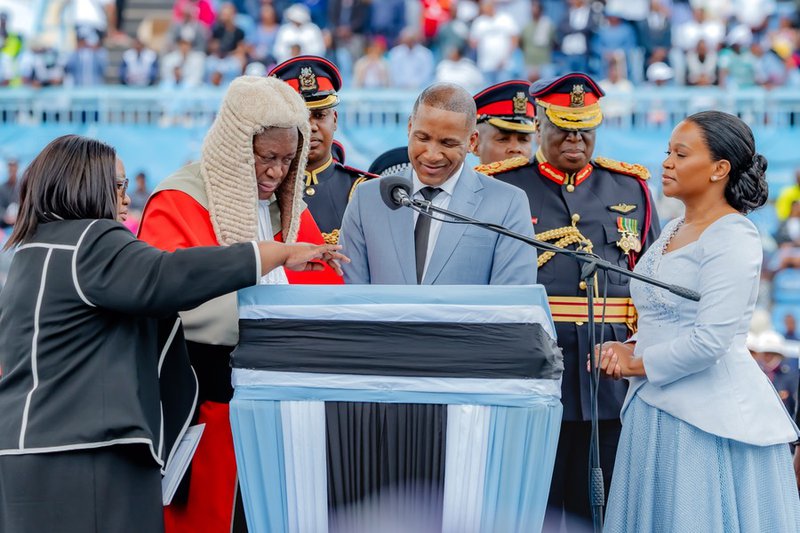Duma Boko takes oath as Botswana’s president
4 min read
Botswana’s new president Duma Boko (C) was sworn in, a week after his landslide election victory. By Monirul Bhuiyan (AFP)

Botswana’s new president Duma Boko (C) was sworn in, a week after his landslide election victory. By Monirul Bhuiyan (AFP)
Botswana’s new president, Duma Boko, was sworn into office on Friday in a historic ceremony that marked the end of 58 years of dominance by the former ruling party. The inauguration, which took place in the capital city of Gaborone, was attended by thousands of citizens from across the country, all eager to witness the peaceful transfer of power to a new government.
Boko, leader of the Umbrella for Democratic Change (UDC), a coalition of the Botswana National Front and the Alliance for Progressives, won a significant victory in the country’s most recent election. The coalition secured 36 parliamentary seats, denying former President Mokgweetsi Masisi a second term and ending the long-standing dominance of the Botswana Democratic Party (BDP) in the country’s politics.
In a moment of grandeur, Boko arrived at the inauguration ceremony in an open-top vehicle, flanked by soldiers carrying the national flag on white horses, before taking the oath of office in front of a jubilant crowd. His first speech as president was both optimistic and unifying, as he sought to reassure the nation and encourage cooperation across political divides.
“Today is a historic moment for our nation,” Boko told the crowd, reflecting on the significance of the peaceful transfer of power. He called for unity, urging the nation to set aside personal and political differences. “It is one of those rare moments that will only be fully understood in retrospect,” he said, emphasizing the gravity of the occasion.
Boko also took time to acknowledge his predecessor, President Masisi, who had been the target of criticism and jeers throughout the campaign. Despite the contentious nature of the election, Boko praised Masisi for his decision to concede power peacefully. “Let’s give him some love for his willingness to step aside without incident,” said Boko, signaling a desire for political maturity and respect for democratic processes in Botswana.
In his speech, Boko expressed his deep affection for the country and its people, promising to serve the nation with dedication and humility. “When I look at you, and you look back at me and say, ‘That’s my boy,’ I know you raised this boy, and I know you love him,” he said. His speech, full of warmth and optimism, resonated with the crowd, even though it provided little detail on his party’s specific plans for the country’s future.
During the election campaign, Boko’s party made several key promises aimed at improving the lives of ordinary Batswana. These included pledges to tackle corruption, introduce a minimum wage of 4,000 Pula (around $302) per month, provide unemployment allowances, increase old-age benefits, and foster new enterprises to stimulate economic growth.
Among the most pressing issues facing the country is unemployment, which continues to rise. According to recent data, unemployment has increased to 27.6% in 2024, up from 25.9% the previous year. This issue is compounded by the global downturn in demand for Botswana’s most important export—diamonds. The country’s mining industry, which relies heavily on the revenues from diamond mining through the government’s joint venture with De Beers, has faced challenges due to declining global demand.
There have been increasing calls from some Batswana for the government to take a stronger role in diamond mining, particularly to increase national ownership and ensure that the country benefits more from its natural resources. As Botswana faces these economic challenges, Boko’s administration will be under pressure to deliver on its promises and create more opportunities for employment and economic growth.
The peaceful transition of power was a notable achievement for Botswana, a country where many citizens had previously doubted whether a non-ruling party could ever peacefully assume office. “Many Batswana never believed they would see the day when power would be handed over peacefully to an opposition government,” Boko said, acknowledging the historic significance of his win.
The inauguration ceremony was attended by several dignitaries, including former Botswana President Ian Khama, South African Deputy President Paul Mashatile, and Julius Malema, leader of South Africa’s Economic Freedom Fighters (EFF). Their presence underscored the importance of the event, not only for Botswana but for the broader Southern African region.
With the formalities of the inauguration completed, Boko now faces the monumental task of delivering on his promises to the people of Botswana. As the new president, he will need to address key challenges, including unemployment, economic diversification, and ensuring that the country’s natural resources are managed in a way that benefits all citizens. However, his message of unity and hope has already set the tone for his presidency, as he seeks to lead Botswana into a new era of democratic progress and prosperity.